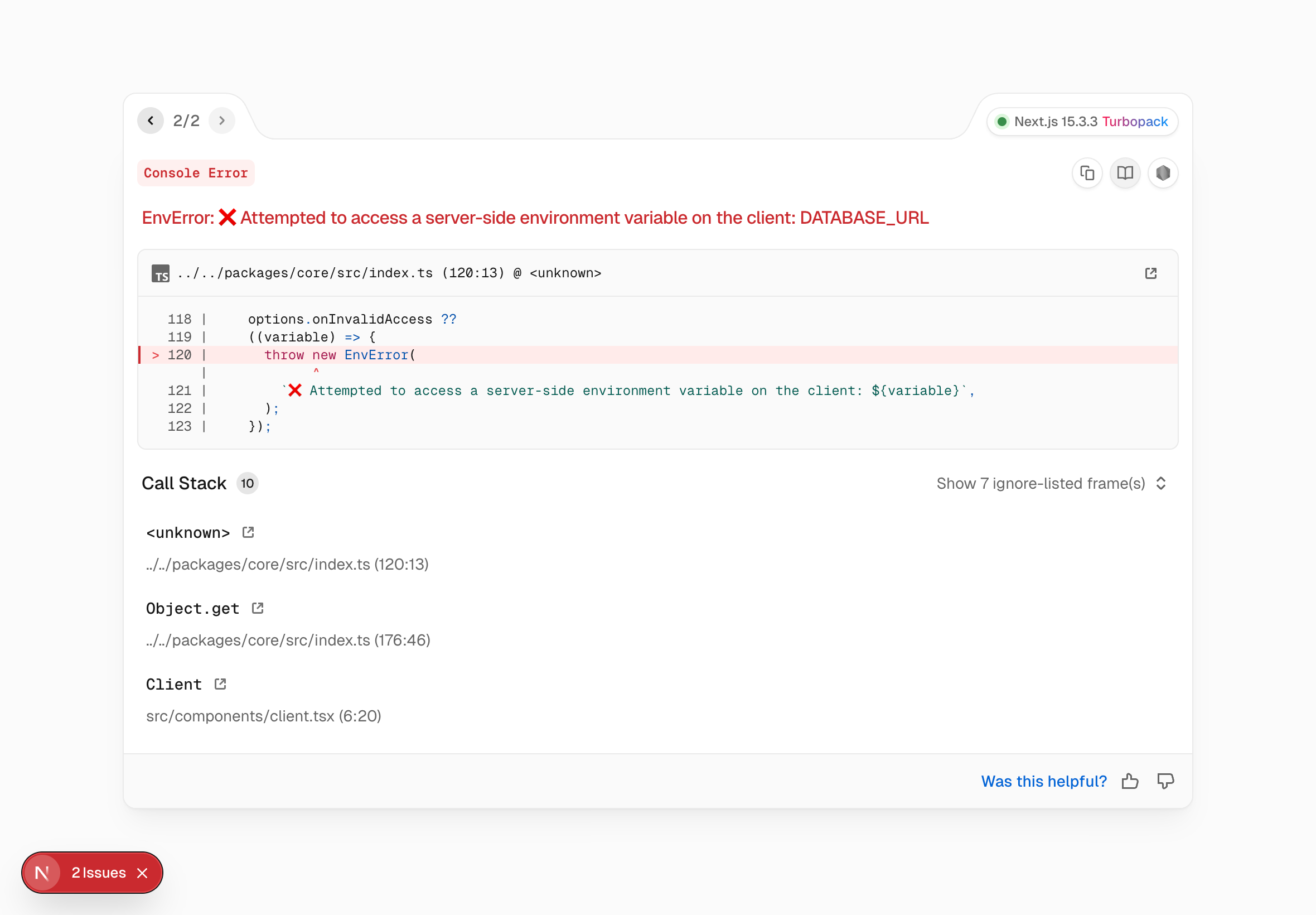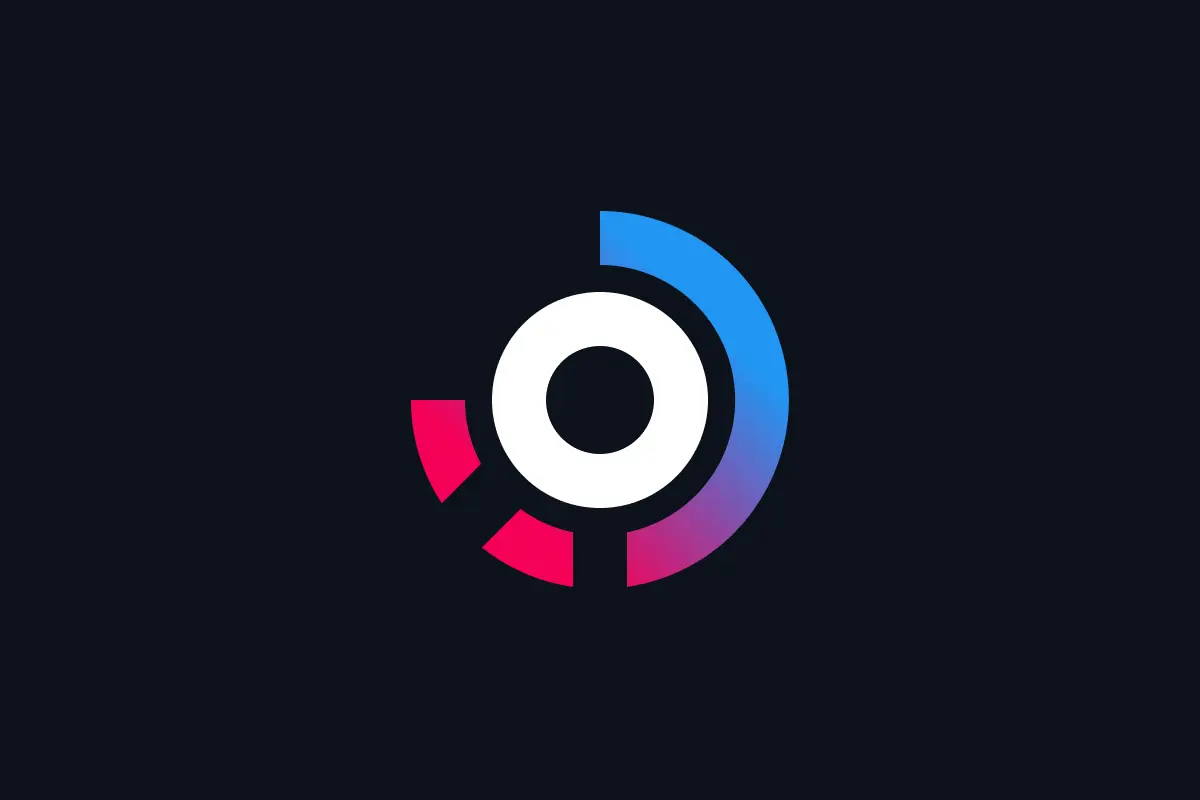Envin - type-safe environment variable validation tool with live previews
Say goodbye to runtime environment variable errors. Envin provides framework-agnostic, type-safe validation with real-time previews and an interactive CLI that works with Next.js, Vite, Astro, and any JavaScript framework.

Environment variables are the silent killers of JavaScript applications. One missing DATABASE_URL, an incorrect API_ENDPOINT, or a mistyped boolean value can bring your entire production deployment to its knees. We've all been there - spending hours debugging why your app works locally but fails in production, only to discover a single environment variable wasn't properly configured.
That's why we're excited to introduce Envin - our new open-source library that brings type-safe environment variable validation to any JavaScript framework. Whether you're building with Next.js, React Native, browser extensions, or any other framework, Envin ensures your environment variables are validated, typed, and accessible with full TypeScript support.

What is Envin?
Envin is a framework-agnostic, type-safe tool designed to validate and preview your environment variables using your favorite schema validator. Built with developers in mind, it provides:
- Type-safe validation - Define your schema once and get full TypeScript support
- Framework-agnostic design - Works with Next.js, Vite, Astro, React Native, and any JavaScript framework
- Client/server separation - Strict protection of server-side variables from client access
- Interactive CLI - Real-time previews and validation during development
- Extensible presets - Pre-configured setups for popular platforms
- Standard Schema support - Works with Zod, Yup, Joi, and other popular validators
Being open-source means complete transparency and community-driven development - you can inspect the code, contribute features, and ensure your project's foundation is secure from day one.
Why environment variable validation matters for startups?
In the fast-paced startup environment, configuration errors can be costly. Consider these common scenarios:
- Production deployments fail because a required environment variable is missing
- API integrations break due to incorrect endpoint URLs
- Security vulnerabilities emerge from exposed sensitive variables
- Team onboarding takes longer because environment setup is complex
- Cross-environment bugs waste precious development time
Envin addresses these challenges by providing a robust, type-safe foundation for environment variable management that scales with your startup's growth.
Environment variables should be boring. When they're properly validated and typed, you can focus on building features instead of debugging configuration issues.
Getting started with Envin
Getting started with Envin is incredibly straightforward, making it accessible for projects of any size.
Installation
Install the core package alongside your preferred schema validator:
# Using npm
npm install envin zod
# Using yarn
yarn add envin zod
# Using pnpm
pnpm add envin zod💡 Pro tip: Envin supports any Standard Schema validator, so you can use Zod, Yup, Joi, or any other validator you prefer!
Basic configuration
Create an env.config.ts file in your project root:
import { defineEnv } from "envin";
import * as z from "zod";
const env = defineEnv({
shared: {
NODE_ENV: z.enum(["development", "production"]),
},
server: {
DATABASE_URL: z.url(),
JWT_SECRET: z.string().min(32),
},
client: {
NEXT_PUBLIC_API_URL: z.url(),
NEXT_PUBLIC_APP_URL: z.url(),
},
clientPrefix: "NEXT_PUBLIC_",
});
export default env;Using validated environment variables
Once configured, access your environment variables with full TypeScript support:
import env from "./env.config";
// ✅ Fully typed and validated
const databaseUrl = env.DATABASE_URL; // string
const apiUrl = env.NEXT_PUBLIC_API_URL; // string
const nodeEnv = env.NODE_ENV; // "development" | "production"
// ❌ TypeScript error - server variable on client
const secret = env.JWT_SECRET; // Error: Cannot access server variable on clientKey features that set Envin apart
Framework-agnostic design
Unlike other environment validation tools that are tied to specific frameworks, Envin works seamlessly across the JavaScript ecosystem:
| Framework | Support | Client Prefix | Built-in Presets |
|---|---|---|---|
| Next.js | ✅ | NEXT_PUBLIC_ | ✅ |
| Vite | ✅ | VITE_ | ✅ |
| Astro | ✅ | PUBLIC_ | ✅ |
| React Native | ✅ | Custom | ✅ |
| Node.js | ✅ | N/A | ✅ |
| Any Framework | ✅ | Configurable | ✅ |
Strict client/server separation
Envin provides built-in protection against accidentally exposing server-side environment variables to the client:
// Client-side component
"use client";
import env from "../../env.config";
export const ClientComponent = () => {
// ❌ This will throw a clear error message
return <div>{env.DATABASE_URL}</div>;
// ✅ This works perfectly
return <div>{env.NEXT_PUBLIC_API_URL}</div>;
};This protection helps prevent security vulnerabilities and makes it impossible to accidentally expose sensitive information like database URLs or API keys to the client.
Interactive CLI with live previews
The Envin CLI provides an interactive development experience with real-time validation:
# Preview your environment variables
npx @envin/cli@latest devThe CLI generates a beautiful web interface that:
- Displays all your environment variables with their current values
- Shows validation status for each variable
- Highlights missing or invalid configurations
- Provides helpful error messages and suggestions
- Updates in real-time as you modify your
.envfiles
This is particularly valuable for:
- Debugging configuration issues during development
- Onboarding new team members with clear visual feedback
- Validating production environments before deployment
Integrating Envin with modern development workflows
Monorepo compatibility
Envin works beautifully in monorepo environments, especially when combined with Turborepo:
// packages/env/env.config.ts
export const createEnv = (clientPrefix: string) =>
defineEnv({
shared: {
NODE_ENV: z.enum(["development", "production"]),
},
server: {
DATABASE_URL: z.url(),
},
client: {
[`${clientPrefix}API_URL`]: z.url(),
},
clientPrefix,
});
// apps/web/env.config.ts
import { createEnv } from "@acme/env";
export default createEnv("NEXT_PUBLIC_");
// apps/mobile/env.config.ts
import { createEnv } from "@acme/env";
export default createEnv("EXPO_PUBLIC_");TypeScript integration
Envin leverages TypeScript's power to provide compile-time safety:
// Type inference works automatically
const config = {
apiUrl: env.NEXT_PUBLIC_API_URL, // Inferred as string
retries: parseInt(env.RETRY_COUNT), // You handle type conversion
features: {
auth: env.NODE_ENV === "production", // Type-safe comparisons
},
};For additional TypeScript improvements, explore our guide on making your TypeScript smarter with one line of code.
Advanced Envin techniques
Custom validation logic
Envin supports complex validation scenarios:
const env = defineEnv({
server: {
DATABASE_URL: z
.string()
.url()
.refine(
(url) => url.startsWith("postgresql://"),
"Database URL must be a PostgreSQL connection string",
),
REDIS_URL: z.url().optional(),
PORT: z.coerce.number().min(1000).max(65535).default(3000),
},
client: {
NEXT_PUBLIC_APP_URL: z
.string()
.url()
.refine(
(url) => !url.endsWith("/"),
"App URL should not end with a trailing slash",
),
},
clientPrefix: "NEXT_PUBLIC_",
});Environment-specific configurations
Handle different environments elegantly:
const env = defineEnv({
shared: {
NODE_ENV: z.enum(["development", "staging", "production"]),
},
server: {
DATABASE_URL: z.url(),
LOG_LEVEL: z
.enum(["debug", "info", "warn", "error"])
.default(process.env.NODE_ENV === "development" ? "debug" : "info"),
},
clientPrefix: "NEXT_PUBLIC_",
});Integration with existing tools
Envin plays well with other development tools:
// Works with dotenv
import "dotenv/config";
import env from "./env.config";
// Integrates with config libraries
export const config = {
database: {
url: env.DATABASE_URL,
ssl: env.NODE_ENV === "production",
},
api: {
baseUrl: env.NEXT_PUBLIC_API_URL,
timeout: parseInt(env.API_TIMEOUT || "5000"),
},
};Envin vs. existing solutions
| Feature | Envin | t3-env | dotenv-safe | envsafe |
|---|---|---|---|---|
| Framework Support | Any | Next.js focused | Any | Any |
| TypeScript Support | ✅ Full | ✅ Full | ❌ Limited | ✅ Full |
| Client/Server Separation | ✅ Built-in | ✅ Built-in | ❌ Manual | ❌ Manual |
| Interactive CLI | ✅ Live Preview | ❌ None | ❌ None | ❌ None |
| Schema Validator | Any Standard Schema | Zod only | Custom | Custom |
| Runtime Validation | ✅ | ✅ | ✅ | ✅ |
| Development Experience | ✅ Excellent | ✅ Good | ❌ Basic | ❌ Basic |
Real-world use cases
E-commerce platforms
For e-commerce applications built with TurboStarter, Envin ensures:
const env = defineEnv({
server: {
STRIPE_SECRET_KEY: z.string().startsWith("sk_"),
DATABASE_URL: z.url(),
WEBHOOK_SECRET: z.string().min(20),
},
client: {
NEXT_PUBLIC_STRIPE_PUBLISHABLE_KEY: z.string().startsWith("pk_"),
NEXT_PUBLIC_APP_URL: z.url(),
},
clientPrefix: "NEXT_PUBLIC_",
});SaaS applications
For SaaS products with complex integrations:
const env = defineEnv({
server: {
DATABASE_URL: z.url(),
REDIS_URL: z.url(),
EMAIL_SERVICE_API_KEY: z.string().min(10),
ANALYTICS_API_KEY: z.string().min(10),
PAYMENT_WEBHOOK_SECRET: z.string().min(20),
},
client: {
NEXT_PUBLIC_APP_URL: z.url(),
NEXT_PUBLIC_ANALYTICS_ID: z.string().min(5),
},
clientPrefix: "NEXT_PUBLIC_",
});Mobile applications
For React Native apps using Expo:
const env = defineEnv({
shared: {
NODE_ENV: z.enum(["development", "production"]),
},
client: {
EXPO_PUBLIC_API_URL: z.url(),
EXPO_PUBLIC_APP_SCHEME: z.string().min(3),
},
clientPrefix: "EXPO_PUBLIC_",
});The future of Envin
We're committed to continuously improving Envin with exciting features on our roadmap:
| Feature | Description | Status |
|---|---|---|
| Visual Schema Builder | GUI for creating environment schemas | In Development |
| Team Collaboration | Shared environment templates | Planned |
| Cloud Validation | Remote environment validation service | Planned |
| IDE Extensions | VS Code and other editor integrations | Planned |
| Auto-migration | Automatic schema updates | Researching |
Getting involved with the community
Envin is open-source and community-driven. Here's how you can get involved:
Contributing
We welcome contributions of all kinds:
- 🐛 Report bugs on GitHub Issues
- 💡 Suggest features through GitHub Discussions
- 📝 Improve documentation with pull requests
- 🔧 Submit code following our contribution guidelines
- ⭐ Star the repository to show your support
Community support
Join our vibrant developer community:
🌟 Join our Discord community to connect with other developers using Envin and get help with your environment variable challenges!
Integration with TurboStarter
While Envin is completely free and open-source, it integrates seamlessly with TurboStarter kits for an even better development experience. TurboStarter customers get:
- Pre-configured Envin setups for web, mobile, and extension projects
- Advanced environment templates for common use cases
- Priority support for Envin-related questions
- Early access to new Envin features and integrations
Start building with confidence today
Environment variable management doesn't have to be a source of stress and bugs. With Envin's type-safe validation, framework-agnostic design, and interactive development tools, you can ensure your applications are properly configured from development to production.
Whether you're building a simple side project or scaling a complex enterprise application, Envin provides the foundation you need to manage environment variables with confidence.
# Get started in seconds
npm install envin zod
# Try the interactive CLI
npx @envin/cli devReady to eliminate environment variable bugs forever?
Start using Envin today and join the developers who are building more reliable applications with type-safe environment variable validation.
For comprehensive documentation and advanced usage examples, visit the Envin documentation.
For those looking to accelerate their development even further, check out our TurboStarter kits which come with Envin pre-configured alongside authentication, database connections, and deployment setups.
If you're working with modern development workflows, explore our guides on Turborepo CLI techniques and Cursor AI best practices to maximize your productivity.
Open source and free forever. Support the project by starring our GitHub repository and sharing it with your fellow developers. Together, let's make environment variable bugs a thing of the past! 🚀
Have you tried Envin in your projects? We'd love to hear your feedback and use cases! Share your experience on GitHub Discussions or join our Discord community to connect with other developers.



